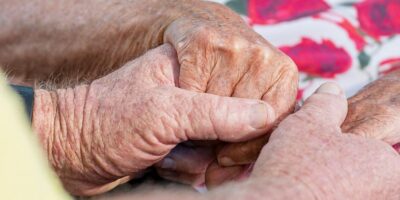Part of living a meaningful life in a care home is about feeling useful, and able to take care of the things that matter to you as much as possible. From hairdressing and daily tasks to going on outings, we look at how a full and meaningful daily routine can make all the difference.
Often the most routine aspects of our day are a great opportunity for shared experiences and a chance to feel like ourselves. Time spent choosing an outfit, brushing one’s hair, going to buy a newspaper, clearing the table or collecting the post are simple tasks that offer much-needed normality. They also help a person understand the ebb and flow of the day and anticipate what might be coming next, so they feel reassured and safe.

GROOMING
If someone has been very attentive to their appearance throughout their life, it is important that we acknowledge this as one of their values and assist them in maintaining this.
The effects of feeling and looking your best are important for everyone, not just the elderly or those living with dementia. Personal grooming is a simple and easy part of a daily routine that can be simply worked into a resident’s day-to-day activities, and if care staff are involved, it really helps with a whole-home approach too. Looking for ways to make activities become part of the day-to-day routine is a really good way to ensure even more stimulation, connection and person-centred care for your residents. And it is so much more than just keeping up appearances.
“We like to think of personal care activities rather than personal care tasks and find that, if carried out with that ethos in mind, they can have a number of therapeutic effects, including adding to a person’s feelings of wellbeing.” Helen Johns, head trainer, The Daily Sparkle
Many of the women, and men, in your care home may have a specific daily morning routine. Take time to find out what this is, and how you might be able to assist them with it. Perhaps you could do their make-up or style their hair for them. This ensures some form of physical interaction with care staff, which generates a positive feeling.
“So often people have little human touch, and this gentle and nurturing act allows physical contact to be a regular part of their life. These positive feelings last far longer than the personal care activities take to carry out.” Helen Johns
The impact of this routine goes well beyond the aesthetic too. A resident is then better orientated and understands that their day has started and is better able to anticipate what might be coming along next – after getting dressed is breakfast, and then we read the paper and then go out for a walk before lunch, and so on. Taking the time to meet these simple needs and ensure these pockets of human contact also means a person can subsequently cope with time alone.

GETTING DRESSED
For many residents, looking well-presented and wearing clothes that they would like to be seen in is really important. Lots of residents especially like to dress up if they’re going out, so ensure they have plenty of notice about appointments and allow time for them to find matching jewellery/pocket handkerchiefs and so on.
You could either do this in the morning or in the late afternoon when picking clothes for the next day, so the person can talk about what’s happening the next day. Ensure care or activity staff take time to discuss outfits, match colours and share ideas about jewellery, handbags, shoes, coats and so on. These are little things, but they can really make a person feel seen and more like themselves.

DAILY TASKS
After getting washed, groomed and dressed, there are all sorts of simple tasks a resident can do on a daily, weekly or monthly basis that will give them a sense of purpose. Good tasks for the morning include delivering newspapers or post, watering the plants, setting tables for breakfast or feeding the home’s pets.
After breakfast, simple administrative or domestic tasks are a good idea. Share them out between a couple of residents or have one task per resident, which they can repeat daily or weekly. This will help them know the time of day or day of the week. Good things to do include putting up posters on noticeboards, informing other residents of activities and mealtimes, setting up and clearing away activity items, dusting, hoovering and cooking tasks such as peeling potatoes or buttering bread. You could even ask for help writing and posting letters or spell-checking newsletters.
In the evening, there are other ways residents can help, from putting the news on in the communal areas at the same time each night, to locking the doors, turning off the lights or tidying the lounge ready for the morning.
When it comes to asking residents to help, the key is to appeal to their caring nature. Even though you do not necessarily need help, residents like to help out and feel useful.
Try phrases such as:
- I’m really struggling with time, could you help me wash the dishes?
- Could you show me where room 44 is? I need to deliver the paper and I know it’s around here somewhere…
- Can you help? I’ve got to make bunting for this fundraising event and more hands make light work. Are you able to do some for me please?
- More helpers make a task easier – are you able to help set a few of these tables with me?
“It’s crucial that any tasks residents may have done before moving into a care home should still be attempted, where possible. Sometimes it may take longer, but the cognitive and social stimulation of the person is more important than simply getting the job done quickly.” Robyn Taylor

GOING OUT
Outings for appointments, shopping or a walk to the park offer a chance to change up the routine, but they may also become a key part of a resident’s week. Remember to make the experience as empowering as possible.
Firstly, make the journey interesting. Your route may take you past interesting places such as parks, schools, churches, shops – perhaps these places are familiar to the resident or there is something new you’d like to show them. You may want to comment on the weather, the flowers, the trees. Simply pointing these things out can make the journey much more enjoyable. If using private transport, put on a suitable CD, and have a singalong. If you think they will be able to recall it, get them to help with directions. Take snacks and drinks with you, and make sure you leave plenty of time for delays, stops or diversions. Sometimes a resident might see something that sparks memories or a happy moment, so if you can afford the time to stop this can be really special.
We include a series of meaningful daily tasks in our monthly activities magazine, sent to you digitally every month. Subscriptions start at £59 per month, but are currently on special offer at half price for the first three months. Find out more >>




